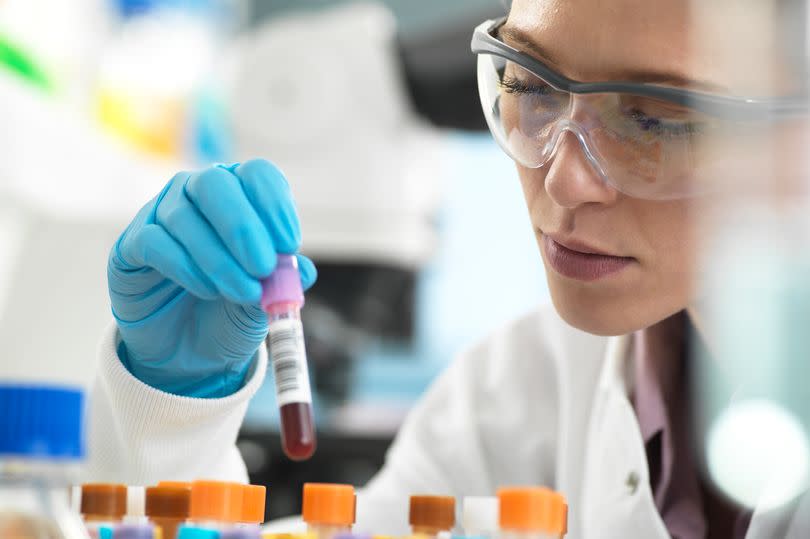Major cancer breakthrough could help detect disease 'seven years earlier'

A significant scientific discovery made in the UK could be used to detect cancer years earlier than current methods.
Two studies funded by Cancer Research UK have identified proteins in the blood that could potentially signal the presence of the disease more than seven years before it can currently be diagnosed.
Scientists from Oxford University pinpointed 618 proteins associated with 19 different types of cancer, including 107 proteins in a group of individuals whose blood was collected at least seven years prior to diagnosis. Researchers believe these proteins could play a role in the very earliest stages of cancer, where prevention is still possible.
They suggest that some of these proteins could be utilised to detect the serious health condition sooner than is presently achievable. The team believes this breakthrough could aid in treating the disease at a much earlier stage - or even preventing it entirely.
The Oxford researchers employed a powerful technique known as proteomics, which allows them to analyse a large set of proteins in tissue samples at a single point in time, observing their interactions and identifying any significant differences in proteins between different tissue samples. In the first study, scientists analysed blood samples from over 44,000 British individuals, including more than 4,900 people who were later diagnosed with cancer.
Using proteomics, the researchers analysed a set of 1,463 proteins from a single blood sample from each individual. The team compared the proteins of individuals who were and were not diagnosed with cancer to identify differences and determine which ones were associated with cancer risk.

Researchers also pinpointed 182 proteins that varied in the blood three years prior to a cancer diagnosis.
In a second study, the team analysed genetic data from over 300,000 cancer cases to conduct a "deep dive" into which blood proteins were implicated in cancer development and could be potential targets for new treatments. They identified 40 proteins in the blood that influenced an individual's risk of developing nine different types of cancer.
While modifying these proteins may increase or decrease the likelihood of someone developing cancer, the researchers also discovered that this could sometimes result in unexpected side-effects.
However, the team, whose findings were published in the journal Nature Communications, emphasised the need for further research to understand the exact role these proteins play in cancer development.
They stated that they also need to determine which proteins are the most reliable for testing, what tests could be developed to detect these proteins, and which drugs could target them.
Dr Keren Papier, joint first author of the first study, said: "To save more lives from cancer, we need to better understand what happens at the earliest stages of the disease. Data from thousands of people with cancer has revealed really exciting insights into how the proteins in our blood can affect our risk of cancer."
Dr Papier, Senior Nutritional Epidemiologist at Oxford Population Health, said: "Now we need to study these proteins in depth to see which ones could be reliably used for prevention."
Dr Joshua Atkins, Senior Genomic Epidemiologist at Oxford Population Health and joint first author of the study stated: "The genes we are born with, and the proteins made from them, are hugely influential in how cancer starts and grows.
"Thanks to the thousands of people who gave blood samples to UK BioBank, we are building a much more comprehensive picture of how genes influence cancer development over many years."
Dr Karl Smith-Byrne, senior author of the first paper and first author of the second study, commented: "We've predicted how the body might respond to drugs that target specific proteins, including many potential side-effects.
"Before any clinical trials take place, we have some early indications of which proteins we might avoid targeting because of unintended side-effects."
Dr Smith-Byrne, Senior Molecular Epidemiologist at Oxford Population Health, concluded: "This research brings us closer to being able to prevent cancer with targeted drugs once thought impossible but now much more attainable."
Senior author of both studies, Professor Ruth Travis, stated: "To be able to prevent cancer, we need to understand the factors driving the earliest stages of its development. These studies are important because they provide many new clues about the causes and biology of multiple cancers, including insights into what's happening years before a cancer is diagnosed."
Adding further, Prof Travis, Senior Molecular Epidemiologist at Oxford Population Health, said: "We now have technology that can look at thousands of proteins across thousands of cancer cases, identifying which proteins have a role in the development of specific cancers, and which might have effects that are common to multiple cancer types."
Dr Iain Foulkes, executive director of research and innovation at Cancer Research UK, commented: "Preventing cancer means looking out for the earliest warning signs of the disease."
"That means intensive, painstaking research to find the molecular signals we should pay closest attention to."
He also added: "Discoveries from this research are the crucial first step towards offering preventative therapies which is the ultimate route for giving people longer, better lives, free from the fear of cancer."
Don't miss the latest news from around Scotland and beyond. Sign up to our daily newsletter.

 Yahoo News
Yahoo News 
